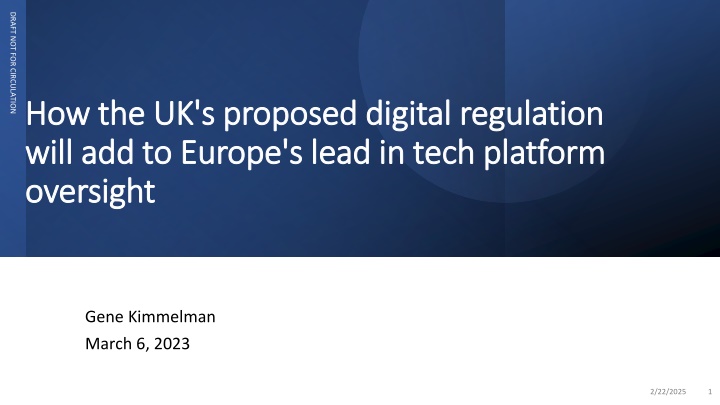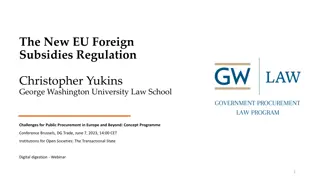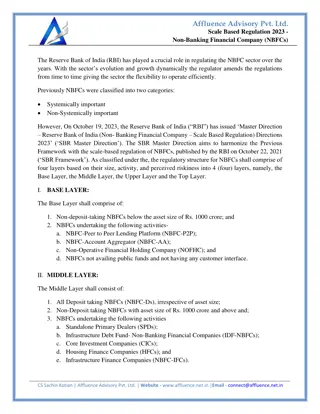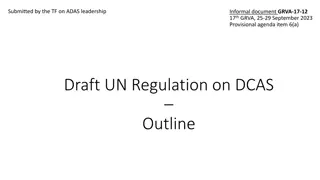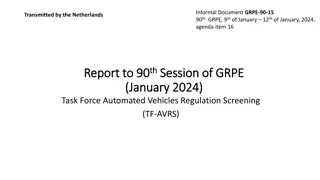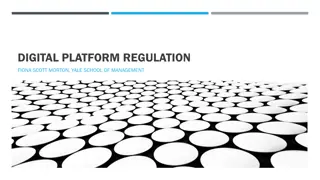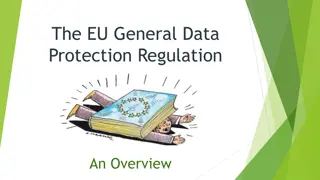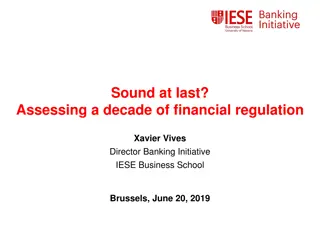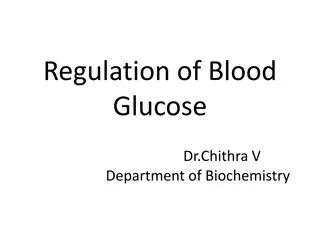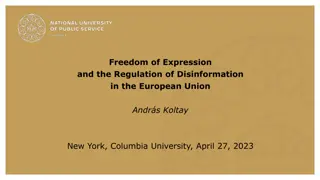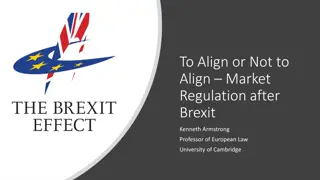How the UK's proposed digital regulation How the UK's proposed digital regulation
This analysis delves into how the UK's proposed digital regulation will impact Europe's lead in tech platform oversight. Explore the unique characteristics of digital markets, the UK's approach outlined in the Furman Report, and the challenges posed by market tipping in today's digital landscape. Understand the implications and potential shifts in competition dynamics within the digital marketplace.
Download Presentation

Please find below an Image/Link to download the presentation.
The content on the website is provided AS IS for your information and personal use only. It may not be sold, licensed, or shared on other websites without obtaining consent from the author.If you encounter any issues during the download, it is possible that the publisher has removed the file from their server.
You are allowed to download the files provided on this website for personal or commercial use, subject to the condition that they are used lawfully. All files are the property of their respective owners.
The content on the website is provided AS IS for your information and personal use only. It may not be sold, licensed, or shared on other websites without obtaining consent from the author.
E N D
Presentation Transcript
DRAFT NOT FOR CIRCULATION How the UK's proposed digital regulation How the UK's proposed digital regulation will add to Europe's lead in tech platform will add to Europe's lead in tech platform oversight oversight Gene Kimmelman March 6, 2023 2/22/2025 1
What Is Different About Digital Markets? Multisided markets firms facilitate interactions (e.g., through search, social media, marketplaces) between two or more groups of users, can set distinct prices to different user groups, and have market power with respect to those groups, while cross-platform network effects occur in at least one direction Strong network effects as the number of users grows, the value of the product to users increases Substantial economies of scale and scope many digital markets exhibit high fixed costs and low or zero variable costs. Firms can therefore rapidly scale up Reliance on large amounts of user data that can be difficult to replicate and costly to analyze Switching costs for example, users may have invested time and effort to create a profile on a social network
What Is Different About Digital Markets? (cont) Often important intellectual property rights including patents which grant the owner a limited-term monopoly over the use of a technology or method Low/zero prices business models that earn revenue from the collection of consumer data, the sale of advertising or the use of customer relationships to sell premium products Disruptive innovations that dramatically reduce transaction and intermediary costs, and may be offered outside of regulatory frameworks that limit competition by incumbents Vertically-integrated and conglomerate business models which may give rise to specific concerns about anticompetitive conduct. Digital platforms that act as gatekeepers These characteristics are not new, but they are taking on a new prominence in digital markets, with significant consequences for market dynamics: concentrated markets and competition for the market dynamics
The UK Approach to Digital Markets The Furman Report The Furman Report In many cases, digital markets are subject to tipping in which a winner will take most of the market Competition for the market cannot be counted on, by itself, to solve the problems associated with market tipping and winner-takes-most Concentration in digital markets can have benefits but also can give rise to substantial costs Today, network effects and returns to scale of data appear to be even more entrenched and the market seems to have stabilized quickly compared to the much larger degree of churn in the early days of the World Wide Web
The UK Approach to Digital Markets Proposed: Proposed: The government has proposed a new "pro-competition regime for digital markets" that will: Designate a few companies as having Strategic Market Status (SMS) Be implemented by a Digital Markets Unit (DMU), housed in the UK's competitionauthority, the CMA Risk-based oversight Define SMS companies that feature: "Substantial and entrenched" market power in at least one digital activity providing it with a strategic position A UK Nexus for the designated activity Minimum revenue threshold to make clear that smaller companies are not in scope of the regime Legislation has not yet been brought to implement the regime, though a bill is expected later this year Bottom Line: Company-specific interventions with an open, flexible, and participatory regulatory process, emphasizing development of a set of behavioral norms
The UK Approach to Digital Markets Proposed Proposed (cont) (cont): : Three objectives for rules governing SMS firms: Fair trading: users should be treated fairly and be able to trade on reasonable commercial terms with firms with SMS Open choices: users should not face any barriers to choosing freely and easily between services provided by firms designated with SMS and other firms Trust and transparency: users should have access to clear and relevant information to understand what services SMS firms are providing, and to make informed decisions about how they interact with the firm
The UK Approach to Digital Markets Proposed Proposed ( (cont cont): ): How will the new regime be implemented? Legislation will have categories of conduct requirements for firms, likely to include: Non-discriminatory terms to certain categories of users Preventing tying the bundling of designated activities with non-designated activities Providing clear, accessible information to users Firm-Specific interventions for individual SMS firms: The DMU will have broad discretion within the categories of conduct requirements established by the law. Interventions can be behavioral, information, or structural remedies to address firms' market power. Similar to CMA s current powers following market investigations Examples: interoperability between platforms or services (behavioral); ownership separation remedies (structural). The latter only where appropriate and other remedies are insufficient Interventions will tackle the root causes of entrenched market power. They will be proportionate and evidence-driven
The UK Approach to Digital Markets Proposed Proposed ( (cont cont): ): How will the new regime be implemented? (cont) It is unlikely that the DMU will be required to demonstrate the competitive effects of SMS firms conduct in order to establish a breach. It will need to consider firms arguments that their conduct is justified by consumer benefits Mandatory reporting requirements for significant M&A. When the SMS company will hold at least 15% of the equity / voting rights after the transaction; the value of the holding is over 25 million; and the transaction meets a UK nexus test
The UK Approach to Digital Markets Proposed Proposed ( (cont cont): ): What protections do firms have? Exemptions for conduct that is "necessary, or objectively justified, based on the efficiency, innovation, or competition benefits it brings" DMU decisions (i.e., SMS designation, findings of conduct requirement violations) will be appealed to the Competition Appeal Tribunal under judicial review principles, in line with other ex ante regulators Investigations may allow for an independent decision maker, an oral hearing, or rights to comment on preliminary findings and proposed remedies Penalties for non-compliance: Up to 10% of global turnover for serious offenses, 5% of daily global turnover for continued breaches, and 1% for information offenses Civil penalties on named managers who fail to comply; criminal penalties for false and misleading information; interim orders for breaches of conduct requirements
The UK Approach to Digital Markets In In Practice Practice Publishing The CMA and Britain's telecoms regulator (Ofcom) issued advice regarding the relationship between digital platforms and online publishers: Payment for publishers' content, to be agreed between the parties with a "backstop" if no agreement reached Increased transparency about the algorithms used by platforms and equal treatment rules regarding their application Limiting platforms to data collection that is "reasonably linked" to the services they provide Rules governing Interoperability CMA conducted a "Mobile Ecosystems" market study The study led the CMA to consider new rules that would prevent Apple from denying or restricting interoperability between its software and hardware with Android devices
The UK Approach to Digital Markets In In Practice Practice ( (cont cont) ) Other countries, such as Germany, are also pursuing enhanced digital markets regulation: Germany s Section 19a of the Competition Law Adopted in January 2021 Intended to better ensure competition in the markets, particularly in the digital sector How does it work? First, the authority designates a company as being of paramount cross-market significance (e.g., due to its dominance in markets, financial strength, access to data). The decision finding that the company has paramount significance is effective for five years Then, the authority can after additional consideration prohibit certain types of perceived problematic conduct. Among others, the following conducts may be deemed problematic: showing preference for one s own products/services on one s platform; pre- installing one s own applications on hardware devices or otherwise including them in one s own offering; preventing other companies from advertising their offers or selling to customers through channels other than those made available by the company
The UK Approach to Digital Markets In In Practice Practice ( (cont cont) ) The Google Data Processing Case Germany In December 2021, the German authority determined that Google is of paramount significance On 23 December 2022 the authority sent Google its preliminary legal assessment (Statement of Objections) in the proceeding initiated due to Google s data processing terms Google s business model relies heavily on the processing of user data. Due to its established access to relevant data gathered from a large number of different services [e.g., Search, Maps, YouTube], Google enjoys a strategic advantage over other companies. [ ]The company has to give users sufficient choice as to how their data are processed. (President of the German Competition Authority, 11 January 2023) Sufficient choice requires: users are able to limit the processing of data to the specific service used; users are to be able to differentiate between the purposes for which the data are processed; the choices offered must not be devised in a way that makes it easier for users to consent to the processing of data across services than not to consent to this; general and indiscriminate data retention and processing across services without a specific cause as a preventive measure, including for security purposes, is not permissible without giving users any choice The authority is currently planning to oblige the company to change the choices offered
The UK Approach to Digital Markets Timeline Timeline Gov's Response to Consultation regarding Consumer/Competition Government Statement Saying That Bill Will Be Brought To Parliament Furman Report Penrose Report Dec. 2020 July 2021 May 2022 Fall 2023 Mar. 2019 Feb. 2021 Apr. 2022 Sep. 2022 Two Government Consultations (Consumer/Competition & digital) Digital Markets Taskforce Proposals Gov's Response to Consultation regarding Digital First Reading of Bill (Expected)
UK vs. EU vs. Germany EU UK Germany New Pro-Competition Regime (UK Proposal) Section 19a, Competition Law Title Digital Markets Act (DMA) Expected: Parliament by spring '23, potentially adopted by Oct '23 Approval Status Approved Approved Undertakings of Paramount Significance for Competition Across Markets Platforms of Strategic Market Significance Scope Digital Gatekeepers German Competition Authority Regulator European Commission Digital Markets Unit (CMA) Prohibited Conduct Principles and Codes of Conduct Specific Conduct (Specified by Regulator based on Law) Specific Conduct Remedies Fines, Behavioral and Structural Remedies, and Interim Measures
Background on the DMA A Refresher A Refresher DMA s objectives [E]nsure a contestable and fair digital sector in general and core platform services in particular, with a view to promoting innovation, high quality of digital products and services, fair and competitive prices, as well as a high quality and choice for end users in the digital sector (whereas no. 107) European Commission Proposal DMA Rules Start To Apply Designation Of Gatekeepers Nov. 2022 Jul. 2023 Mar 2024 Dec. 2020 May 2023 Sep. 2023 Companies Notify Number Of Users DMA Enters Into Force Application Of Obligations
Background on the DMA A Refresher A Refresher ( (cont cont) ) DMA provisions are meant as a complementary tool to antitrust based on observed limitations of EU antitrust enforcement actions against dominant platforms. The DMA is a rules-based approach to platform regulation, not principles-based. It thus specifies deadline-driven procedures, prohibitions on certain practices (e.g., contractual restrictions), and ex ante obligations (e.g., no self- preferencing), some of which may require technical implementations, to ensure contestability and fairness. Companies subject to the DMA are identified as gatekeepers, including emerging ones, through an up-front designation mechanism using both quantitative and qualitative parameters. Gatekeepers are providers of core platform services that: 1) have a significant impact on the European market; 2) provide a core platform service which is an important gateway for business users to reach end-users; and 3) enjoy an entrenched and durable position, in its operations, or it is foreseeable that they will. Comprehensive remedies include fines of 10% of worldwide revenue in a preceding financial year (up to 20% in cases of repeated non-compliance), periodic penalty payments (up to 5% of daily revenue), and a merger moratorium for systemic non-compliance; DMA actions are not subject to efficiency defenses (though security and proportionality defenses can be made); enforcers are not required to engage with gatekeepers to implement DMA requirements. 2/22/2025 DRAFT NOT FOR CIRCULATION 16
Summary of DMA Obligations and Prohibitions Commercial Relations Mobile Ecosystems Data-Related Reporting Ban MFN clauses (5(3)) Anti-steering (5(4)) Reader rule (5(5)) Ban gag clauses (5(6)) Termination (6(13)) Un-installation/choice screens (6(3)) Side-loading apps (6(4)) Switching (6(6)) Report about implementation (11) Inform about mergers (14) Audit re techniques for profiling consumers (15) Ban on data combination (5(2)) Data silos (6(2)) Data portability (6(9)) Access to data generated by users (6(10)) Access search data for online search engines (6(11)) Fair Access Transparency Interoperability Tying Transparency on ads pricing (5(9) and 5(10)) Transparency on ads performance (6(8)) Fair ranking and ban of self-preferencing (6(5)) FRAND access conditions (6(12)) Vertical interoperability for hardware/software (6(7)) Interoperability for NI-ICS (7) Tying with ancillary services (5(7)) Tying between CPSs (5(8)) 2/22/2025 DRAFT NOT FOR CIRCULATION 17
How might the EUs DMA interact with UK and Germany? Could more generalized legal standards (such as the UK approach) address a broader set of potentially harmful market practices than those specifically prohibited by the DMA? Consider: Not all self-preferencing behavior is prohibited by the DMA only search index and ranking preferencing Under this standard, behavior like having your own ad-supported presentation that does not treat other companies ad services the same could be legal DMA requires side loading or offering alternative payment options What if Apple or Google do not offer both of these? The CMA or the German Competition authority could have the power to seek broader interventions that require both side loading AND alternative payment options
Current Powers of the CMA Promoting Competition and Tackling Unfair Behavior: Enforce the prohibition on anti-competitive agreements and the prohibition on abusing a dominant position Bring criminal prosecutions against individuals responsible for implementing hardcore cartels Seek director disqualification orders against any directors involved in competition law breaches Investigate mergers and block or seek remedies for those that result in a substantial lessening of competition Launch investigations into any industries to ensure markets are competitive the CMA can seek remedies (including divestitures) where there is an adverse effect on competition resulting, for instance, from the market structure or the conduct of one or more companies NB: In certain regulated industries, the relevant sectoral regulators have the power to enforce competition law in their respective regulated industries concurrently with the CMA (i.e., Ofcom for Telecommunications)
A predecessor of the Digital Markets Approach Open Banking Open Banking In the past, market studies by the CMA alongside EU regulatory efforts spurred initiatives like the new pro-competition regime for digital markets. One example is Open Banking. Payment Services Directive 2 (PSD2) is passed in 2015 and implemented in 2018 to require banks to provide access to third-party providers with customer consent UK Treasury establishes the Open Banking Working Group (OBWG) with representatives from banking, fintech, consumer groups, and regulators to explore Open Banking implementation CMA launches a 2016 investigation into the retail banking sector, identifying a lack of competition and innovation Report from 2016 CMA investigation recommends developing Open Banking in the UK This report could have led to a recommendation to break up the big banks Open Banking Order is passed in 2016, requiring largest UK banks to make customer data available to third-party providers through APIs The Order is implemented in two phases and overseen by the Open Banking Implementation Entity (OBIE) in 2016, which also developed technical specifications for how open APIs should be designed and implemented
New Horizontal CMA Powers Proposed Proposed: : In addition to the powers specifically linked to the digital sector, the CMA is expected to be granted further horizontal powers Market studies and investigations A civil penalty regime for companies breaching market investigation orders and directions. The penalty would be capped at 5% of global turnover. The proposed penalty regime will apply to undertakings, directions, orders and interim measures Enhancing CMA's ability to amend remedies in a ten-year period following the finding of an adverse effect on competition in a market investigation. The CMA will be able to supplement remedies "to achieve better outcomes This is a massive augmentation in power! CMA could use this power as a stick to achieve compliance and/or experiment with behavioral remedies that could escalate into divestiture requirements Enable the CMA to require businesses to trial remedies to determine the final format of certain remedies relating to what, when and how information is presented to consumers
New Horizontal CMA Powers Proposed Proposed ( (cont cont): ): Merger Control Introducing a new threshold designed to capture so-called "killer acquisitions" (i.e., acquisitions by incumbents of nascent competitors that could play a significant competitive role in the market in the future) and adapting other thresholds; procedural changes General Investigations New evidence gathering powers; additional powers to sanction companies who fail to cooperate (max. caps of 1% of global turnover for non-compliance with investigation measures and max. 5% for non-compliance with remedies) Consumer Protection Significantly strengthen the consumer law enforcement regime by enabling the CMA to directly enforce consumer law through the imposition of fines; changes to tackle subscription traps and fake reviews and to enhance protections for savings schemes
How Will The UK Approach Interact with EU Efforts? The UK law will have a more general standard than the EU, with more defenses and balancing tests Will it align with what the DMA is doing? Go beyond it? Undermine it? The CMA chief wants to ensure that the CMA continues to be a leading enforcer. The CMA: Set up a specialist Data, Technology and Analytics Unit (2019). It has data scientists, data engineers, technology insight advisors and behavioral insight advisors who work on digital cases and projects Conducted Market Studies in Mobile Ecosystems and Digital Advertising Has several ongoing investigations in the digital sector Plans to continue to work closely with the European Commission and other international counterparts. E.g., the CMA launched a case considering Meta s use of data in parallel with the European Commission Needs to think about coherence with regulations in other jurisdictions and cooperation with international counterparts worldwide is more important than ever The . . . frustration is that we were [initially] ahead of the European legislation [in drafting the rules] . . . we re now behind. (A. Coscelli, Former CMA Chief, FT, 20 June 2022) "I firmly believe that the UK continues to act as a global leader on these issues." (S. Cardell, Current CMA Chief, The Platform Law Blog, 25 January 2023)
Will The UK Regime Have Global Reach? Post-Brexit, the CMA has powers to look at a broader range of M&A transactions (some were reviewed by the European Commission before) Facebook / Giphy In November 2021, the CMA order Facebook to sell Giphy (the transaction had already been completed) The CMA considered that the merger would reduce competition between social media platforms and that the deal has already removed Giphy as a potential challenger in the display advertising market. Facebook s platforms (Facebook, WhatsApp, Instagram) account for 73% of user time spent on social media in the UK, and Giphy is the world s leading provider of free GIFs and GIF stickers In October 2022, Facebook said it would sell off Giphy after appealing the decision and failing Sabre / Farelogix In April 2020, the CMA prohibited the merger only two days after a U.S. federal court rejected the DOJ s attempt to block the transaction Sabre and Farelogix both supply software solutions to facilitate the booking of airline travel The CMA and the DOJ collaborated closely in their separate reviews of the Sabre/Farelogix Transaction. The conclusions reached by the CMA on the one hand, and the DOJ on the other, closely mirrored each other, with both antitrust authorities displaying concern that the Transaction would lead to a stifling of innovation How were the CMA s actions enough to unravel these deals globally, rather than just in the UK? Difficulty of winning appeals to the Competition Appeals Tribunal? Size of UK market? Lack of global agreement on competition policy? Future What happens if the CMA blocks Microsoft/Activision and the US and the EU do not? NB: This deal has been challenged by the US FTC and is being investigated by the European Commission and the CMA
Ongoing investigations alongside new regime Investigation into Meta's use of ad data (opened in June 2021). Investigation into Apple App Store (opened in March 2021). Investigation into Google's "Privacy Sandbox" browser changes (opened in January 2021). Investigation into Google's conduct in ad-tech (opened in May 2022). Market investigation into mobile browsers and cloud gaming alleging Apple and Google duopoly (November 2022). Investigation into Google's conduct in the distribution of apps on Android devices (opened June 2022). Merger Inquiry opened into Microsoft acquisition of Activision (opened July 2022). Brought under UK Consumer Legislation Investigation into Amazon's Marketplace (opened in July 2022). Investigation into online console video gaming (opened in April 2019). Investigation into fake reviews (opened in June 2019).
How will companies react? Companies may... readily implement new obligations fight new obligations in court adopt a cooperative approach, talking to the CMA How will companies... react to different but compatible regulatory regimes (e.g., EU, UK, Germany...)? e.g., Amazon is meeting EU limits on its Buy Box conduct and use of third-party seller data react to potentially different and incompatible obligations? e.g., conflicts between inter-jurisdictional approaches to privacy and data sharing obligations
Discuss Implications for the United States Will U.S. firms: Divest ad servers and preempt remedies in US cases like US v. Google? Begin to negotiate settlements? Play hardball and just try to comply with European requirements? Support softer regulatory proposals in the US? Find it tougher to argue against remedies modeled upon DMA or UK requirements that may stem from ongoing antitrust cases?
Thank you Questions?
